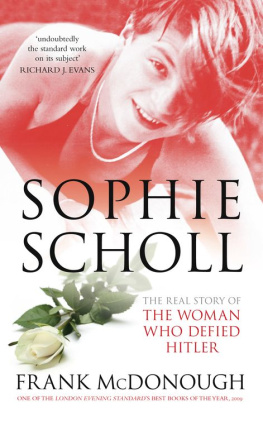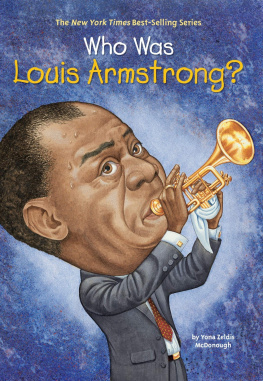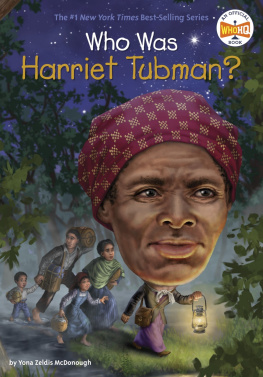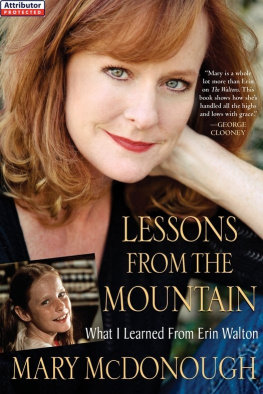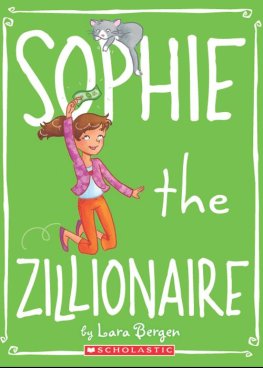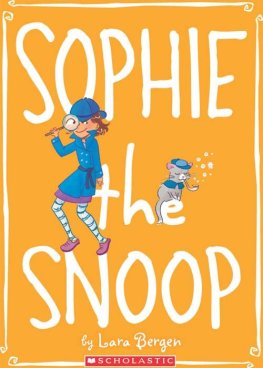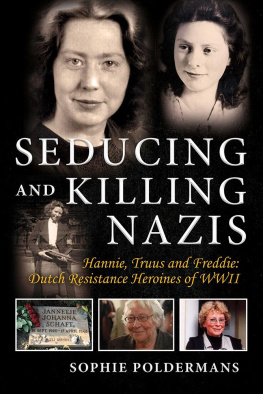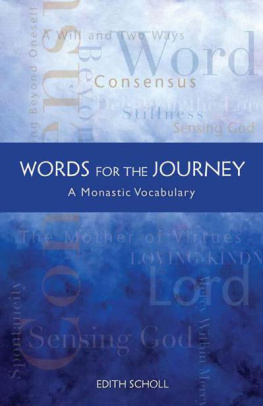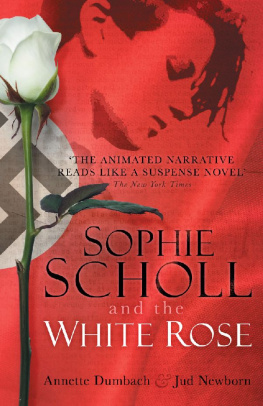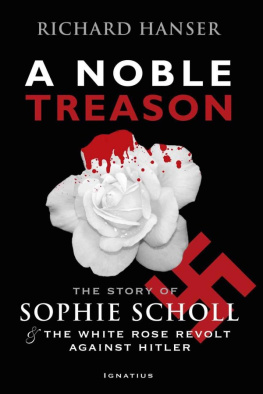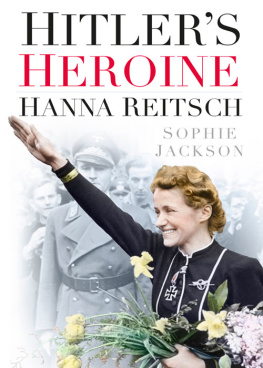McDonough - Sophie Scholl
Here you can read online McDonough - Sophie Scholl full text of the book (entire story) in english for free. Download pdf and epub, get meaning, cover and reviews about this ebook. year: 2010, publisher: The History Press, genre: Non-fiction. Description of the work, (preface) as well as reviews are available. Best literature library LitArk.com created for fans of good reading and offers a wide selection of genres:
Romance novel
Science fiction
Adventure
Detective
Science
History
Home and family
Prose
Art
Politics
Computer
Non-fiction
Religion
Business
Children
Humor
Choose a favorite category and find really read worthwhile books. Enjoy immersion in the world of imagination, feel the emotions of the characters or learn something new for yourself, make an fascinating discovery.
- Book:Sophie Scholl
- Author:
- Publisher:The History Press
- Genre:
- Year:2010
- Rating:4 / 5
- Favourites:Add to favourites
- Your mark:
- 80
- 1
- 2
- 3
- 4
- 5
Sophie Scholl: summary, description and annotation
We offer to read an annotation, description, summary or preface (depends on what the author of the book "Sophie Scholl" wrote himself). If you haven't found the necessary information about the book — write in the comments, we will try to find it.
Sophie Scholl — read online for free the complete book (whole text) full work
Below is the text of the book, divided by pages. System saving the place of the last page read, allows you to conveniently read the book "Sophie Scholl" online for free, without having to search again every time where you left off. Put a bookmark, and you can go to the page where you finished reading at any time.
Font size:
Interval:
Bookmark:
For Cecile Lowenthal Hensel who also
opposed Hitlers Nazi regime
Front cover illustration: Sophie Scholl as a teenager, 1938 Manuel Aicher
The political history of all nations has hardly ever produced anything greater and nobler than the opposition which existed in Germany. These people fought without any help, whether from within or from without, driven only by the uneasiness of their consciences. As long as they were alive, they were invisible to us, because they had to put on masks. But their deaths brought their resistance to light.
SIR WINSTON CHURCHILL
I know that life is a doorway to eternity, and yet my heart so often gets lost in petty anxieties. It forgets the great way home that lies before it.
SOPHIE SCHOLL
On 22 February 1943, three Munich University students belonging to a non-violent resistance group called the White Rose were executed by the Nazi regime. One of them was a twenty-one-year-old woman called Sophie Scholl. Her youthful defiance against a monstrous tyranny has made her a legendary figure. There are countless schools, streets and squares named in her honour. In 1999, the popular German womens magazine Brigitte voted her Woman of the Twentieth Century. In a major German TV series in 2003, called GreatestGermans, Sophie Scholl was the highest-ranked German woman of all time. In 2005, a German film called SophieScholl: The Final Days became a major box-office hit.
In this book I provide the first full-scale biography of this truly iconic figure, which draws on a wide variety of original documents, including her letters and diaries, key Gestapo interrogation documents, court files and interviews with important survivors. The problem in dealing with the life of such a saint-like figure is the easy temptation to ignore evidence or gloss over incidents that render the image more complex. I have decided to present what I have discovered in full. I know every biographer claims they are about to relate an incredible story, but what is so fascinating about this biography is that I take you not only inside Sophie Scholls inner thoughts and feelings, but also on a journey inside Nazi Germany to the life of an ordinary family living in a small city.
What emerges is the story of an ordinary person who chose to make a courageous stand against Hitlers regime, not with bombs, but with words, expressed in leaflets, that proclaim a moral and religious opposition to Nazism and a passionate desire to live in a free society. This is a heart-rending tale of a principled, free-spirited, fascinating and life-affirming young woman living in the wrong place at the wrong time. Lets go in search of Sophie Scholl.
Sophie Magdalena Scholl was born in Forchtenberg on 9 May 1921. This small, provincial, scenic rural village had a population of 900 people at the time of Sophies birth. It is located on the Hochstrasse, in the district of Hohenlohekreis, in the south German state of Baden-Wrttemberg. It lies on the site of a partly fortified north-facing hill, overlooking the rich vineyards and farmland of the picturesque Kocher valley, at the point where the Kupfer River flows into the Kocher River. Sophies earliest memories were of playing in the beautiful countryside surrounding the picture-postcard village and swimming in the river. Wine-producing has always been a central aspect of the area. Vineyards enclosed by stone walls litter the terrain.
Forchtenberg was originally established as an overspill from the nearby town of Wlfingham, which lies directly on the opposite side of the river. The two large cities closest to Forchtenberg are Stuttgart and Nuremberg. It lies on the barbarian side of the famous Roman Limes Wall, which stood at the edge of the Catholic Holy Roman Empire. The original Christian church dates back to 536 and the centre of the village can trace its history back to the Middle Ages.
The local residents of the region are known as Swabians. They do not regard themselves as full-blown Bavarians, retaining a distinct history, identity, a recognisable dialect, a well-known reputation for non-conformity and a healthy disrespect for authority. The most well-known Swabian saying is Kiss my Ass. Swabia was once part of Bavaria, but it is now in the state of Baden-Wrttemberg, in the administrative region of Stuttgart.
Outside of Germany, many Swabians settled in Hungary, Romania, Turkey, Serbia and Kazakhstan. In 1814, Ludwig Uhland, a leading figure in the German Romantic movement, wrote a poem called Swabian Intelligence (Schwbische Kunde), which recounts the story of a brave Swabian soldier, serving in the army of Frederick Barbarossa, who remains cool and calm during a ferocious battle, enduring constant attacks by the Turks with enormous restraint, until quite suddenly and unexpectedly he fights back, killing all his opponents.
In Germany, Swabians are often depicted in jokes as stingy, prudish and overly serious. In the famous fairytale The Seven Swabians (DieSiebenSchwaben) they are portrayed as stupid. A famous Swabian homily is: A man saves the most if he buys nothing at all. It is difficult to fathom these unfair images of Swabians when it is realised that among those born in this region of Germany were Friedrich Schiller, the poet; Friedrich Hegel, the philosopher; Rudolf Diesel, inventor of the diesel engine; Karl Benz, inventor of the first petrol powered motor car; and the world-renowned physicist, Albert Einstein. These days, Swabians are still viewed as frugal and hard-working, but also now as clever and entrepreneurial. Baden-Wrttemberg is the most economically successful state in modern Germany.
But at the time of Sophie Scholls birth Germany was in the grip of a deep political and economic crisis, brought about by military defeat in the First World War. There were riots, assassinations and gun battles in all the major cities. In November 1918, Adolf Hitler, then just a lowly corporal in the German army, was recovering from a mustard gas attack in a military hospital when he heard news of the German defeat. Everything went black again before my eyes, he later recalled, I tottered and groped my way back to the dormitory, threw myself on the bunk, and dug my burning head into my blanket and pillow So it had all been in vain.
Then came the hated Treaty of Versailles, imposed on Germany by the victorious Western Allies. For Germans this was a crippling humiliation.
Germany was also suffering terrible economic problems. Between 1919 and 1923 inflation rose to astronomical levels. A single US dollar in January 1923 was worth 17,000 marks, by July 353,000 marks and by
Yet in the sheltered idyllic surroundings of Forchtenberg all these problems seemed a very long way away. Sophie, the fourth child of the Scholl family, was born in the local town hall. Her father Robert Scholl was the mayor. The family lived during her early childhood in a palatial and roomy apartment located inside the town hall building.
Robert Scholl was born on 13 April 1891 in Steinbrck, then a poverty-stricken area, north of Forchtenberg, known as the Mainhardter woods. At secondary school he made a very good impression on a local Protestant pastor, who encouraged him, after he left school, to attend a highly reputed college for management professionals and lawyers in Stuttgart. He emerged with very useful qualifications in taxation and law.
During the First World War, with German nationalist feelings running high, Robert Scholl adopted a highly unusual pacifist stance. He refused to serve in the military or even carry a gun and he was deeply opposed to Germanys militaristic and expansionist war aims. After this nonconformist protest, he was assigned to a post in the ambulance corps of the Red Cross and served in a military hospital in Ludwigsburg, a suburb of Stuttgart.
Font size:
Interval:
Bookmark:
Similar books «Sophie Scholl»
Look at similar books to Sophie Scholl. We have selected literature similar in name and meaning in the hope of providing readers with more options to find new, interesting, not yet read works.
Discussion, reviews of the book Sophie Scholl and just readers' own opinions. Leave your comments, write what you think about the work, its meaning or the main characters. Specify what exactly you liked and what you didn't like, and why you think so.

